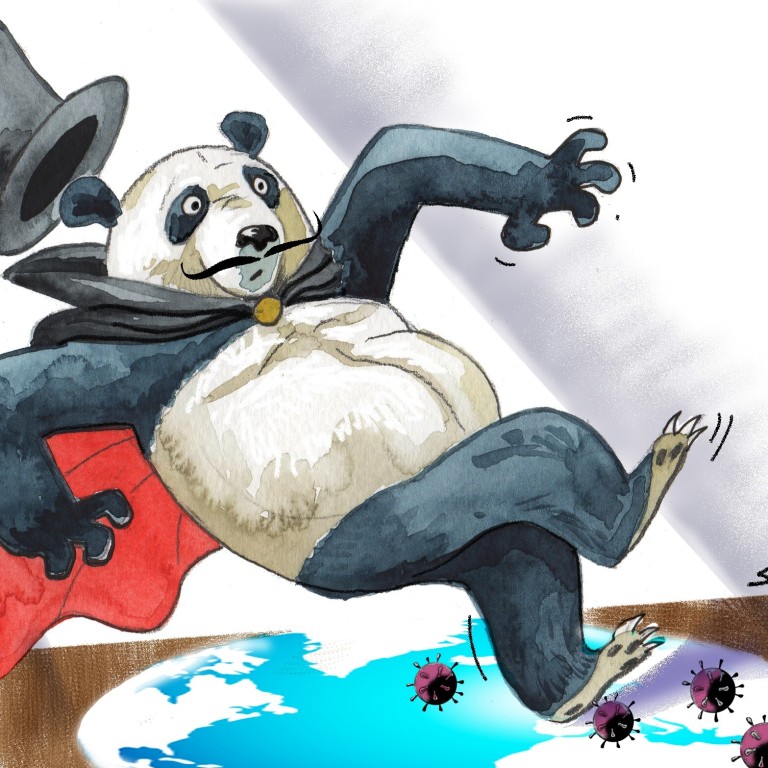
How China is losing the world’s trust following its cover-up of the coronavirus crisis
- Beijing failed to go public with the true scale of the pandemic, hampering other nations’ ability to respond in time
- China’s rise on the global stage was made possible by the goodwill of the rest of the world, and trust that had been hard earned should not be so easily squandered
The lacklustre response of the Trump administration to the coronavirus pandemic and its failure to live up to the traditional US role during a global crisis has led some to wonder whether China can fill this void.
While Sino-Russia relations have been growing increasingly intimate under President Xi Jinping and his counterpart Vladimir Putin, Russia closed its direct borders with China in late January and suspended visa-free travel from China on February 2. Iran, a key strategic partner of China, stopped all flights between the two countries on January 31.
Pakistan, also a key partner of China’s, did not repatriate its citizens, but this choice was motivated more by Pakistan’s own public health deficiencies than faith in China’s ability to handle the pandemic.
Fact vs fiction: Timeline of a coronavirus war of words between US and China
Even Iran has criticised China for hiding the true extent of the outbreak, with health ministry spokesman Kianush Jahanpur lamenting that its inaccurate data “made a bitter joke with the rest of the world”.
It took China decades of incremental progress to build significant faith within the international system for it to rise to the position as the world’s No 2 superpower. Critical leadership decisions, especially from the reform era under Deng Xiaoping, not only lifted hundreds of millions of Chinese out of poverty, but also helped reintroduce China to the world stage.
But these reforms, and their results, would not have been possible without the engagement and support of the global community. It was not until after relations between Washington and Beijing were normalised under the Jimmy Carter administration in 1979 that Deng announced the start of the reform and opening up initiative.
China’s subsequent rise in the 40 years that followed would not have been possible without the continued exchanges of trade, investment, education, and technological know-how with the West. I know this because I was a part of it; through my work at the Library of Congress, I helped establish some of the first exchanges between students and librarians in the 1970s.
Death of Hong Kong-born nurse highlights UK needs in virus fight
The trust that was the foundation of these exchanges did not come out of nowhere; it was built slowly, brick by brick, through the careers of countless diplomats, academics and government officials. It was cultivated by journalists, whose reports from China helped shape public perception in their home countries and strengthened support for further engagement.
The Tiananmen Square crackdown in 1989 wrought a significant blow to this foundation of trust, but did not shatter it; in little more than a decade after the tragedy, president Bill Clinton was paving the way for China’s entrance into the World Trade Organisation, which only further cemented China’s rise to become the world’s second-largest economy.
The unexpected tumult that followed in September 2001 brought about new opportunities for US-China cooperation in the global “war on terror”, and throughout the 2000s China continued to seek greater leadership opportunities on the global stage.
Trust was a key component in China’s rise. Some of this trust was perhaps overly optimistic and naive, but the foundation of it was painstakingly built and earned. This trust was compromised before the coronavirus pandemic, but these cracks have splintered into chasms.
US-China tensions over Covid-19 could reignite the trade war
How can Britain, or any country, trust China to provide critical components for its 5G infrastructure when it could not trust Beijing to provide accurate information about a public health crisis?
The generation now leading China does not remember the country before 1949. They did not experience how the US and China worked together during World War II in their united fight against Japan.
The younger generation in China does not remember the country before normalisation with the US and before Deng’s reforms. They may take for granted the trust that these changes were predicated on and that has been fundamentally compromised by the coronavirus pandemic.
Why we need to uncover the origins of Covid-19
This is an issue entirely separate from blame over the virus’ origin. Regardless of how the virus started, Xi’s and his government’s penchant for secrecy has compromised the health, safety and economic stability of his own people and of the world.
Xi may try to control his people’s response to his ineptitude through propaganda and censorship, but the rest of the world will not as easily forget. He will need a new approach – and better advisers – to help rebuild the trust that has been lost.
Chi Wang, a former head of the Chinese section of the US Library of Congress, is president of the US-China Policy Foundation
Sign up now and get a 10% discount (original price US$400) off the China AI Report 2020 by SCMP Research. Learn about the AI ambitions of Alibaba, Baidu & JD.com through our in-depth case studies, and explore new applications of AI across industries. The report also includes exclusive access to webinars to interact with C-level executives from leading China AI companies (via live Q&A sessions). Offer valid until 31 May 2020.











